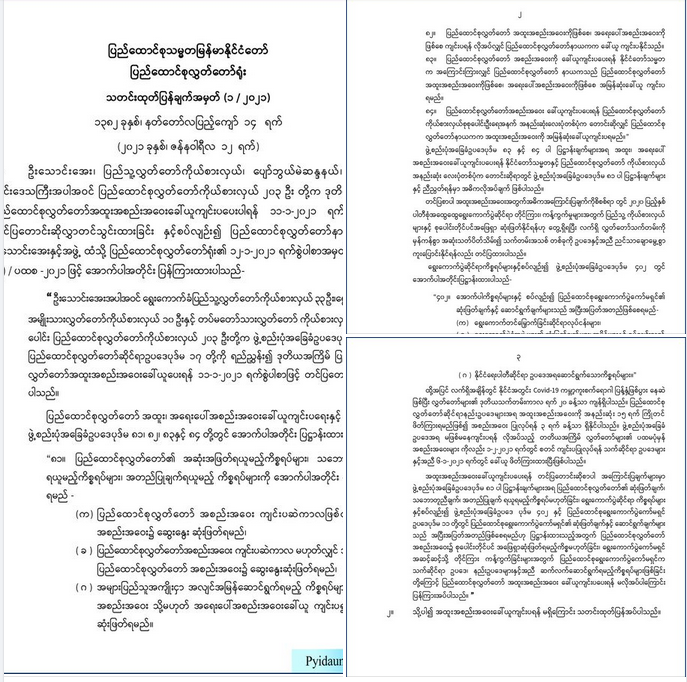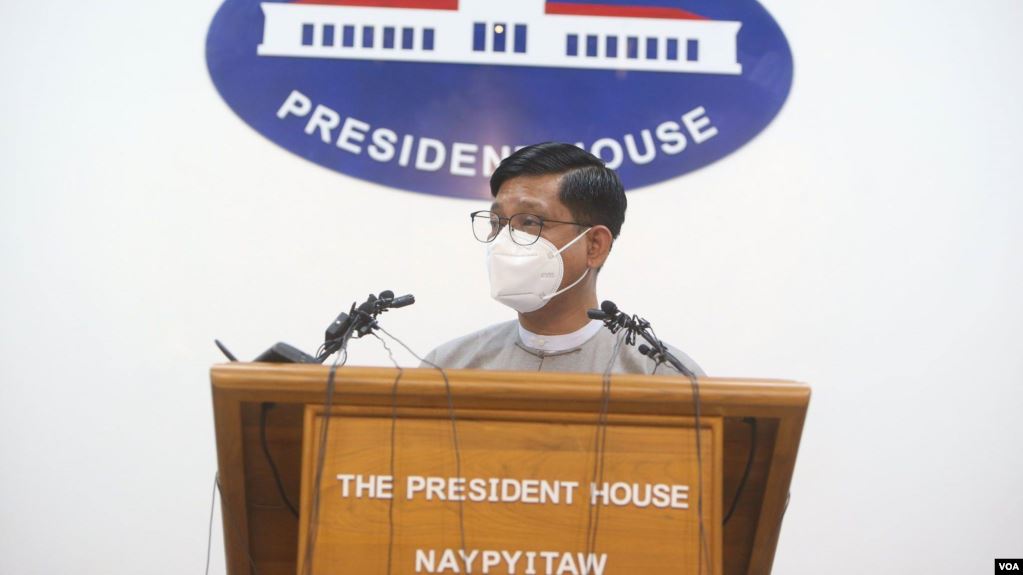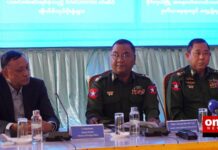The row between the Tatmadaw or military bloc and the National League for Democracy (NLD) has been brewing for weeks since the latter won a landslide victory in general elections held on November 8, 2020.

The military, military-backed Union Solidarity and Development Party (USDP) and Democratic Party of National Politics (DNP) have recorded over a million instances of voting fraud. The USDP has reportedly filed more than 1,000 cases with the UEC and nearly 200 cases with the police, according to the RFA report of January 11.
Lately, commander-in-chief General Min Aung Hlaing told the Chinese foreign minister Wang Yi that the Tatmadaw is re-investigating electoral irregularities to be in line with democratic norms and support democracy, during the November 8 general elections, reported RFA on January 12.
The military bloc (Tatmadaw, USDP and DNP) first asked for related documents from the Union Election Commission (UEC) to investigate the voting process on some 200 townships where the Tatmadaw families voted, which was rejected.
At a press conference on January 5, the USDP and DPN rejected the NLD landslide win in November elections and filed a joint complaint with the Supreme Court accusing the government and UEC authorities of electoral fraud.
President Win Myint and three other government officials as well as UEC chairman Hla Thein and 14 others were named as defendants.
The Supreme Court accepted the parties’ Application of Writ and on January 5 issued a schedule of video-conference hearings on January 29 involving the plaintiffs. The preliminary hearing will determine whether the court accepts the filing and takes up the case. The court’s decision will be final, according to the recent RFA report.
Again, on January 11, the military bloc proposed a special parliamentary session to be held in order to clear up the irregularities that it said exist. This was also turned down.
The proposal of military bloc to call special parliamentary session was rejected one day after by the Union Parliament Office on January 12, stating: difficulties because of Covid-19 pandemic; only 20 days legislature period were left, which will take 15 days only to send out invitation; first, third legislature parliamentary session earmarked for February 1, with invitation being already sent out on January 6; not the business of the Union Parliament to rule or discuss on election-related complaints; and complaints could and should be directed at UEC according to the given procedures.
The Union Parliament Office also pointed out that the UEC has full authority regarding the elections according to the UEC Law as stated in the Constitution.

“[Election disputes] are not resolved in Parliament as the Constitution grants the UEC the final decision,” T Khun Myat Speaker of the Union Assembly said. He added that alleged malpractices filed with election sub-commissions will be resolved by the UEC and the procedures are still taking place, according to the report by The Irrawaddy.
Theoretically, as the military bloc has more than one fourth of parliamentarians, the session could be called. But the NLD said because of time constraint it won’t be able to do it and instead will go for the first, third legislature parliamentary session to elect presidents and form government.
By all indications the row is bound to be intensified either for good or bad.
If it should turn out to be good, the UEC will have to do explanation on what the Tatmadaw made public to clear up the irregularities that it said exist. It won’t do just to stick to the notion that what the UEC decides is final.
The bad thing about it will be the power struggle between the NLD and the Tatmadaw will intensify and this will be played out in parliamentary sessions and also the civil war situation on the ground.
The implications are that the Tatmadaw and as well the NLD are trying to woo the ethnic nationalities, both armed and unarmed political organizations, each in its own way.
The national unity government formation promoted by the NLD has outlined to achieve its goals through peace-building, national-building, and state-building, dubbed “New Peace Architecture” initiative or approach.
The NLD first approach to woo the ethnic political parties (EPPs) wasn’t successful as the local Mon and Kayah political parties cannot agree on the meeting venue. The NLD stuck to its central committee directive to hold meeting only at its party office in ethnic states, while the Mon and Kayah parties wanted to meet at a neutral place. As a result the planned meetings were derailed.
Thus, the NLD deliberation so far cannot be seen as successful but more an outright failure, due to its paternalistic attitude, said the EPPs. To make the matter worse, Dr Myo Myunt, NLD spokesperson for central said something like: “It is up to the invitees whether they wanted to come or not in response to the house owner’s invitation”.
This was interpreted by some ethnic nationalities to be insensitive when the visiting NLD team to the ethnic states was said to have considered itself to be the house owner. A blunder or adding insult to the injury, so to speak.
Regarding the nationwide ceasefire agreement (NCA)-non-signatory ethnic armed organizations (EAOs), the NLD-led government has sent out a draft for bilateral ceasefire agreement to the Northern Alliance – Burma (NA-B), including all other Federal Political Negotiation and Consultative Committee (FPNCC) members, to ponder and eventual meeting personally.
NA-B is a military and political front made up of the Arakan Army (AA), Kachin Independence Army (KIA), Kokang or Myanmar National Democratic Alliance Army (MNDAA), and Ta’ang National Liberation Army (TNLA).
FPNCC members are NA-B four members, plus United Wa State Army (UWSA), Mongla or National Democratic Alliance Army (NDAA), and Shan State Progress Party (SSPP). It is strictly a political alliance.
So far as the Tatmadaw is concerned, it has made some headway in reaching an unofficial bilateral ceasefire and even able to secure the release of the three NLD members abducted by the AA prior to the November elections, including three Tatmadaw soldiers who were sick and needed medical attention.
On January 7, the Tatmadaw urged the NLD government to hold elections in nine Arakan State townships and one in Shan State. But the NLD rejected them the following day, saying that more security and time are needed to conduct and hold elections.
In sum, the NLD would need to show more largesse and reconciliation attitude to the EPPs in the form of coalition-style agreement rather than just doling out some minister or deputy-minister portfolios, like the last time. And so far as the NCA-non-signatory EAOs’ wooing is concerned, the first step should be to reach bilateral ceasefire with the NA-B, eventually followed by trust-building talks with the FPNCC as a whole, which of course will have to be coordinated with the Tatmadaw.
As for the Tatmadaw, it needs to show sincerity by expanding the unofficial bilateral ceasefire with AA to become permanent and involving all other EAOs which have not yet reached bilateral ceasefire agreement.
The recent escalation of armed conflict with the Karen National Liberation Army (KNLA), armed wing of the Karen National Union (KNU), a staunch NCA-signatory, should also be decelerated or completely halted, if the NCA is to be taken seriously by the non-signatory EAOs, which are watching the development on the ground attentively. The same goes for the on-and-off armed clashes with the Restoration Council of Shan State (RCSS), also a staunch NCA believer, like the KNU.
And the only way the Tatmadaw could win trust or empower trust-building will be to stop all wars in ethnic states. Not stopping it Arakan State against the AA only to heighten the war on KNU in Karen State, just like it has been repeatedly doing during the past decades.
People could still remember that the Tatmadaw signed bilateral ceasefire in Kachin State with the KIA to later launched an all out war on the KNU in Karen State, in the mid-1990s.
Nearly two decades later the Thein Sein government got the KNU to sign NCA and eventually the Tatmadaw started to wage war against the KIA in Kachin and Shan states, which is still ongoing although the intensity has lessen due to the unofficial bilateral ceasefire because of the KIA’s keen interest in Kachin internally displaced persons’ repatriation.
In short, a holistic approach in which the Tatmadaw and NLD-led government will be on the same wavelength is a real necessity to bring peace, reconciliation and political settlement; not trying different tactics without coordination aimed at only making piece-meal political profit separately. Actually it is up to the two Bamar stakeholders to consider if they really want to end the civil war and establish an equitable federal union together with the ethnic nationalities or just want to maintain the Bamar supremacy, unitary state with some federal trappings.
Thus, if the election irregularities row cannot be resolved in an altruistic manner for the benefit of the people between the Tatmadaw and the NLD, a bigger picture of peace-building, nation-building and state-building will remain an illusion that won’t be materialized anytime soon.











Leave a Comments